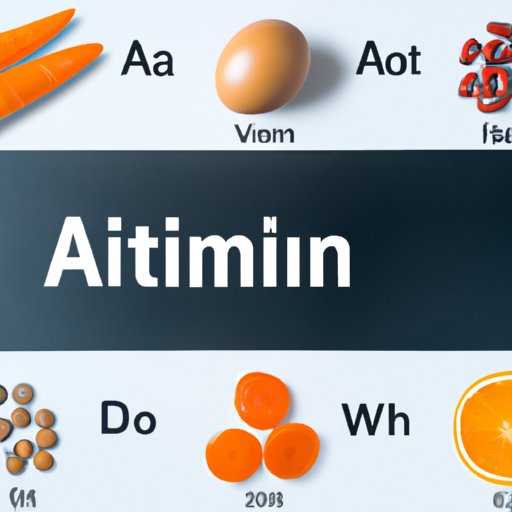Introduction
Vitamin A is a crucial nutrient that plays numerous roles in our bodies, from supporting healthy vision to boosting our immune system. In this article, we will explore all the essential aspects of vitamin A, including its definition, functions, types, food sources, benefits, and risks. Whether you want to optimize your health or treat a vitamin A deficiency, this guide will provide you with all the information you need to know about vitamin A.
A Beginner’s Guide to Vitamin A: What It Is and Why Your Body Needs It
Vitamin A is a fat-soluble nutrient that exists in two main forms in our diets: retinol (found in animal products) and carotenoids (found in plant-based foods). While retinol is readily available to our bodies and can be stored for later use, carotenoids need to be converted into retinol to be fully utilized. Vitamin A performs several vital functions in the body, such as supporting vision, promoting cell growth and differentiation, and maintaining the skin’s health and immune system.
The recommended daily intake of vitamin A for adult men is approximately 900 mcg (3,000 IU), and for adult women, it’s 700 mcg (2,333 IU). Pregnant and breastfeeding women may need higher amounts, up to 1,300 mcg per day.
10 Foods Rich in Vitamin A and How to Incorporate Them into Your Diet
If you’re looking to increase your vitamin A intake, incorporating foods rich in both retinol and carotenoids into your diet is a great place to start. Some of the best plant-based sources of carotenoids include sweet potatoes, carrots, spinach, kale, and mangoes. Animal-based sources of retinol include liver, eggs, and dairy products.
Try out some of these healthy recipes and meal plans to boost your vitamin A intake:
- Carrot and ginger soup
- Kale and sweet potato salad
- Mango and spinach smoothie
- Egg and vegetable frittata
Vitamin A Benefits for Skin, Vision, and Immune System: How It Works
Vitamin A is essential for maintaining healthy skin, as it regulates the production of skin cells and helps prevent acne, psoriasis, and other skin conditions. Additionally, vitamin A plays a critical role in supporting eye health, particularly night vision, by contributing to the formation of the retina’s pigmented layer. Lastly, vitamin A is crucial for a robust immune system, as it enhances the production and activity of white blood cells that fight off infections and diseases.
Exploring the Different Types of Vitamin A: Retinol, Carotenoids, and More
As mentioned earlier, there are two main types of vitamin A: retinol and carotenoids. Retinol and its derivatives, such as retinal and retinoic acid, are mostly found in animal products and are beneficial for vision and skin health. On the other hand, carotenoids, such as beta-carotene and alpha-carotene, are abundant in plant-based foods and can also have positive effects on our immune system and overall health.
Is Vitamin A Deficiency a Global Health Issue? The State of the Problem and Possible Solutions.
Vitamin A deficiency is prevalent worldwide, particularly in developing countries where people lack access to nutrient-rich foods. The health consequences of vitamin A deficiency can be severe, such as blindness, stunted growth, and increased susceptibility to infections. To combat this problem, several strategies have been implemented, such as fortifying staple foods with vitamin A and providing supplements to vulnerable groups like pregnant and breastfeeding women and young children.
Vitamin A Supplements: When to Use Them and How to Choose the Right Product
If you’re unable to meet your vitamin A needs through diet alone, supplements can be an effective way to ensure adequate intake. However, you need to be careful when selecting a vitamin A supplement, as excessive intake can lead to toxicity and negative side effects. Always consult a healthcare professional before taking any supplements and make sure to choose a reputable brand that contains safe and effective forms of vitamin A.
The Dark Side of Vitamin A: Risks and Side Effects of Overconsumption or Misuse
While vitamin A is crucial for our health, excessive intake or long-term use of high-dose supplements can lead to toxicity and cause adverse health effects. Symptoms of vitamin A toxicity include nausea, dizziness, dry skin, and hair loss, while prolonged excessive intake can increase the risk of birth defects, osteoporosis, and liver damage. That’s why it’s essential to follow the recommended daily intake guidelines and avoid overconsuming vitamin A supplements unless advised by a healthcare professional.
Conclusion
Vitamin A is a vital nutrient that our bodies require for numerous functions, from promoting healthy vision and skin to supporting our immune system and overall health. However, deficient or excessive intake of vitamin A can cause adverse effects on our health, so it’s crucial to follow the recommended daily intake guidelines and choose high-quality supplements only if necessary. Make sure to incorporate plenty of vitamin A-rich foods into your diet and consult a healthcare provider for personalized guidance on optimal vitamin A intake.
